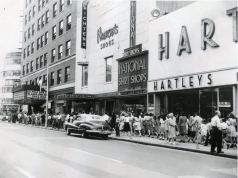In its heyday, it was home to some of the most innovative performances and playwrights in the world and was a beacon of pride for the city of Miami. From former U.S. president Harry Truman to David Letterman and some of the most notable artists and celebrities of the 20th century, the Coconut Grove Playhouse drew the most impressive visitors of any location in Miami.
“The playhouse brought together many great playwrights like Tennessee Williams and Samuel Beckett,” says local Miami historian Paul George. “They would come to see their plays performed. So many important people came to the playhouse, it brought so much light to the area.”
In 2023, though, the glamorous days of the playhouse are long gone. What was once a hub for innovation in the world of theater now stands dilapidated and abandoned. The playhouse has been closed for 17 years and has been the subject of prodigious controversy.
Now its future remains uncertain, as county officials mull whether to utilize taxpayer dollars to turn it into a 300-seat theater, demolishing about 83% of the structure to transform the space into commercial stores and luxury apartments with a multi-story parking garage.
Carmen Pelaez, a local Cuban-American writer, director and actress feeels outraged and publicly denounced the playhouse’s closure and the county’s plan.
“County politicians underestimate the locals, Miami is not about ‘flash and trash’ ” says Pelaez. “There’s so much more to this city and they (local politicians) don’t see the substance and the culture we have to offer.”
The playhouse originally opened as a movie theater on January 1, 1927 with the name Player’s State Theater. The first closing occurred not long after its inauguration as a consequence of the Great Depression. It reopened in 1930 with new film premieres, but once World War II began, the theater found a new use as a training school for the U.S. Army Air Corps navigators. This lasted until 1955.
That same year, George Engle, a successful oilman, abandoned his lucrative oil business for the world of live theater by becoming a producer and the owner of the playhouse. Under Engle’s ownership, the building was renovated by renowned architect Alfred Browning Parker and officially reopened as the Coconut Grove Playhouse on January 3,1956.
In the years that followed, the theater gained attention as one of the country’s leading theaters. After changing ownership multiple times, the state of Florida purchased the building in 1980, and it thrived under the artistic direction of actor-director José Ferrer, a recipient of both a Tony and an Academy Award. Ferrer resigned 5 years later, and financial trouble struck the venue.
In 2006, the playhouse permanently closed its doors after accumulating significant debt due to poor financial oversight and change in the theater and film industries. Also, other venues of a larger scale opened their doors in Miami. The Adrienne Arsht Center is a prominent example.
“Once the playhouse closed, it really deadened Coconut Grove,” mentions George.
The theater has remained at a standstill ever since and is now under a 50-year joint lease agreement with two 25-year renewal options made by Miami Dade County and Florida International University.
Christine Dolen, a theater critic, argues that the county’s plan is the most realistic.
“A 300-seat theater is better scaled for contemporary, 21st-century theater created in Miami.” states Dolen. “I don’t think Coconut Grove would be able to support a huge theater.”
But for some locals, the county’s plans for the playhouse represent a much larger problem within the city of Miami.
In 2009, local resident and University of Miami Film and Theater Graduate Max Pearl noticed faults with the demolition plan and knew he had to get involved. He began the grassroots movement, Save Our Playhouse, as a way of uniting people in the area in order to organize a defensive strategy against the county officials’ plans.
Pearl later created the Facebook page, Save The Coconut Grove Playhouse, where more than 10,000 members of the community joined online to keep up with updates and tirelessly push for a plan for the theater that dedicates 100% of the space to the performing arts.
“I met the actor Tony Randall in an elevator inside the playhouse and got his autograph,” says Pearl, “Just look at the famous artists who created our culture who performed at the playhouse and you’ll see why this is a landmark we must save, and we will.”
The Save our Playhouse Movement is backed financially by the Coconut Grove Playhouse Foundation, which was created by attorney and cultural philanthropist Mike Eidson, who vowed to aid in the movement’s goal for the playhouse. The foundation’s plan would be fully funded by federal, state, county, city, corporate, foundation and private funds and would place an emphasis on full restoration in hopes of reviving Miami’s local theater scene and bringing an educational aspect for the community.
In 2015, Miami-Dade commissioners approved Gablestage, a local professional theater company, and Arquitectonica, a prominent architecture firm, to oversee the new plans for the space. The Gablestage move never happened as that plan bogged down in controversy.
After years of no concrete plans being implemented for the space, the city approved the county’s plan for the partial demolition of the playhouse’s structure in January of this year. By February, an appeal had been filed by Coconut Grove residents’ lawyer, David Winker, arguing that the city had acted outside of its jurisdiction by approving the demolition application from the county.
The group’s appeal was upheld by the city’s planning and zoning appeals board in March. This was a significant accomplishment for the Save Our Playhouse movement and local residents. But the group knows this is only a small battle in a much bigger and longer fight for the future of the playhouse. The appeal served as a way to pressure the county into a different course of action for the site, but the group expects the county to legally challenge them once again.
Despite the prolonging of the plans for the playhouse, the group remains confident that its plan is the right thing for the community and its residents. The group will keep applying pressure on politicians and locals to take action in any way they can.
“I won’t stop fighting for this until an official decision is made, but until then, I will fight for this until the end because this city deserves it,” says Pelaez, “even if our politicians can’t see that.”
































